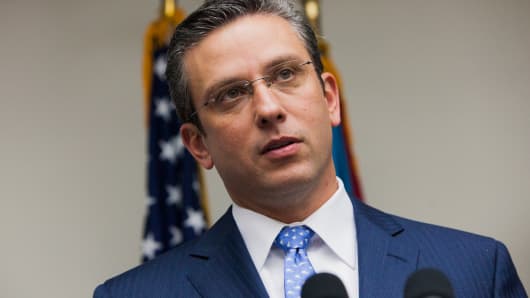Puerto Rico does not have the ability to repay the $70 billion debt that was generated by past administrations and their creditors. The debt must be restructured fairly and equitably to both the people of Puerto Rico and the bondholders.
A fair solution to the problem is critical in order to bring progress back to the island. The case of Puerto Rico is similar to New York City's and Detroit's, except they had the tools to restructure their debt, and Puerto Rico does not.
My administration has acted swiftly. Puerto Rico adopted the most stringent austerity measures. The Island's budget has been cut by billions during my term. The payroll has been reduced dramatically. We have deferred other obligations. We have withheld tax refunds.
Payables to suppliers have reached more than $2 billion. The inability to pay our suppliers has resulted in the loss of commercial credit and many services must now be paid on delivery. Without supplier credit, medicines and supplies for public hospitals and air-ambulance service to trauma centers are now in jeopardy.
The emergency measures we have taken are unsustainable, harm our economy, reduce revenues and diminish our capacity to repay our debts. Puerto Rico cannot endure any more austerity.
In order to yield a permanent fix to the debt crisis, lacking the mechanisms that New York and Detroit had, we introduced our own restructuring statute; but the federal courts closed that door. We have tried to negotiate a settlement with the creditors to no avail. This is why we sought the support of Congress. Their response was PROMESA, the Puerto Rico Oversight, Management and Economic Stability Act.
PROMESA is a mixed bag. On the one hand, it provides the tools needed to protect the people of Puerto Rico from disorderly actions taken by the creditors. The immediate stay granted by the bill on all litigation is of the utmost importance in this moment. Most importantly, the authority to adjust our debt stock provides the legal tools to complete a broad restructuring and route Puerto Rico's revitalization.
On the other hand, PROMESA has its downsides. It creates an oversight board that unnecessarily undercuts the democratic institution of the Commonwealth of Puerto Rico. But facing the upsides and downsides of the bill, it gives Puerto Rico no true choice at this point in time.
On July 1, 2016, Puerto Rico will default on more than $1 billion in general obligation bonds, the island's senior credits protected by a constitutional lien on revenues. Creditors and bond insurers have initiated multiple lawsuits and last week, hedge funds filed an injunction before the Southern District of New York claiming the "absolute highest priority" over government resources, including those needed for essential public services. That complaint minces no words and states that, in "times of scarcity," bondholders should be paid before essential services.
No amount of contingency planning can shield us from the fallout of the defaults in the coming days; no amount of contingency planning will replace the necessity of a debt restructuring regime. We have suffered a decade of economic contraction. We are facing a government less capable of providing the services which the public needs.
As governor, I will use my remaining time in office to benefit from the tools provided by PROMESA and develop a fiscal plan that is faithful to the best interests of the people of Puerto Rico.


